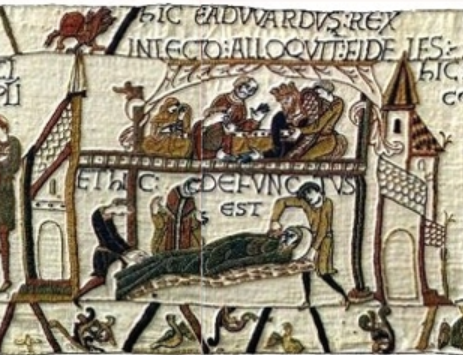Hastings to Henry I
The time period between 1066 and 1100 are pivotal to the history of Belchamp Walter.
Most historical accounts assign the control of the area to Aubrey de Vere, however there are many questions on how this came about. de Vere was William the Conqueror's bother-in-law and did not assist William at the Battle of Hastings. Due to the conflicts between William's sons Robert, William (II - Rufus) and Henry (I), the lands given to William Malet (that were inherited by Robert Malet) that were "given" to the Malet's as a consequence of William Malet who was a participant at the Battle of Hastings, the lands may have passed to de Vere.
The Death of Harold at the Battle of Hastings
Depending on who is telling the story the death of Harold as a consequence of the battle it is different.
The most common report was that William Malet was responsible with the burial of Harold.
Harlold's mistress, Edith Swan Neck, identified his body on the battle field.
Harold's Mother as seen depicted on the Bayeux Tapestry offered his weight in gold for his body but
William gave this task to William Malet.
Top
The body had been badly mutilated by Norman knights following the battle and Edith is said to have
identified it as Harold by marks 'known only to her'. Although Harold's distraught mother Gytha pleaded with
William the Conqueror to release
Harold's body to her for burial and offered his weight in gold, William coldly refused.
Having thus regained his superiority, the duke returned to the main battlefield, and he could not gaze
without pity on the carnage, although the slain were evil men, and although it is good and
glorious in a just war to kill a tyrant. The bloodstained battle-ground was covered with the
flower of the youth and nobility of England. The two brothers of the king were found near
him, and Harold himself stripped of all badges of honour could not be identified by his face,
but only by certain marks on his body. His corpse was brought into the duke's camp, and
William gave it for burial to William, surnamed Malet, and not to Harold's mother, who
offered for the body of her beloved son its weight in gold. For the duke thought it unseemly
to receive money for such merchandise, and equally he considered it wrong that Harold
should be buried as his mother wished, since so many men lay unburied because of his
avarice.
